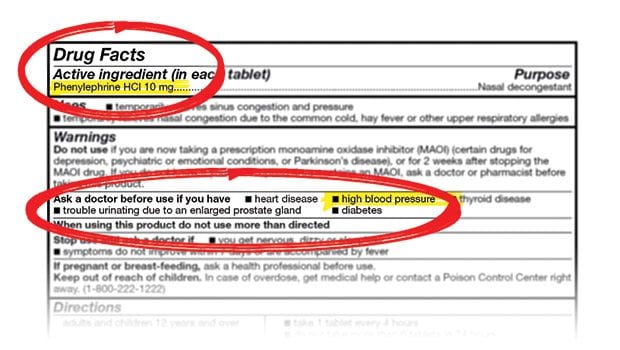
People assume that because over-the-counter drugs are so easily available, surely they must be safe. For the most part, that is true. That does not mean, however, that everyone can take them without suffering a negative reaction.
For instance, an excessive intake of acetaminophen (Tylenol) can cause liver failure; too much aspirin can cause internal bleeding.
People with high blood pressure have to be particularly vigilant in consuming OTC pills. Although they are taken to remedy a particular complaint, they may unknowingly worsen one’s pressure.

Antihistamines and decongestants are some of the biggest culprits. Decongestants relieve nasal stuffiness by narrowing blood vessels in the nose. This narrowing, however, can affect other blood vessels, which can increase blood pressure. Decongestants can also interfere with the effectiveness of some prescribed blood pressure medications.
Look for these ingredients on the label of cold and allergy medications:
- Oxymetazoline
- Phenylephrine
- Pseudoephedrine
These medications are not the only ones to avoid. Some OTCs are high in sodium, which are known to elevate blood pressure numbers. Look for wording like “sodium” or “soda.” Sodium bicarbonate is a common medication used to relieve heartburn and indigestion. In one particular brand of bicarbonate, each tablet contains 178 milligrams of sodium. The maximum dose recommended is 12 pills a day. That equals 2,136 mg of sodium, which exceeds the daily recommended limit of 1,500 mg for people with high blood pressure.
NSAIDS — nonsteroidal anti-inflammatory drugs — such as ibuprofen, are used to relieve pain and inflammation for such conditions as headaches and arthritis. However, NSAIDS can cause the body to retain fluid, which in turn causes the pressure to rise.
Herbal supplements are not exempt. There is a misperception that herbal remedies are always safe. Not so. Ginkgo biloba and St. John’s wort, both of which are used for depression, have been known to increase blood pressure as a side effect. Even licorice, a common ingredient in herbal medications and cough syrups, can have an effect.
The bottom line is if you have high blood pressure — even if you are on treatment for it — it is advisable to ask your provider or a pharmacist if a particular OTC drug is safe.







